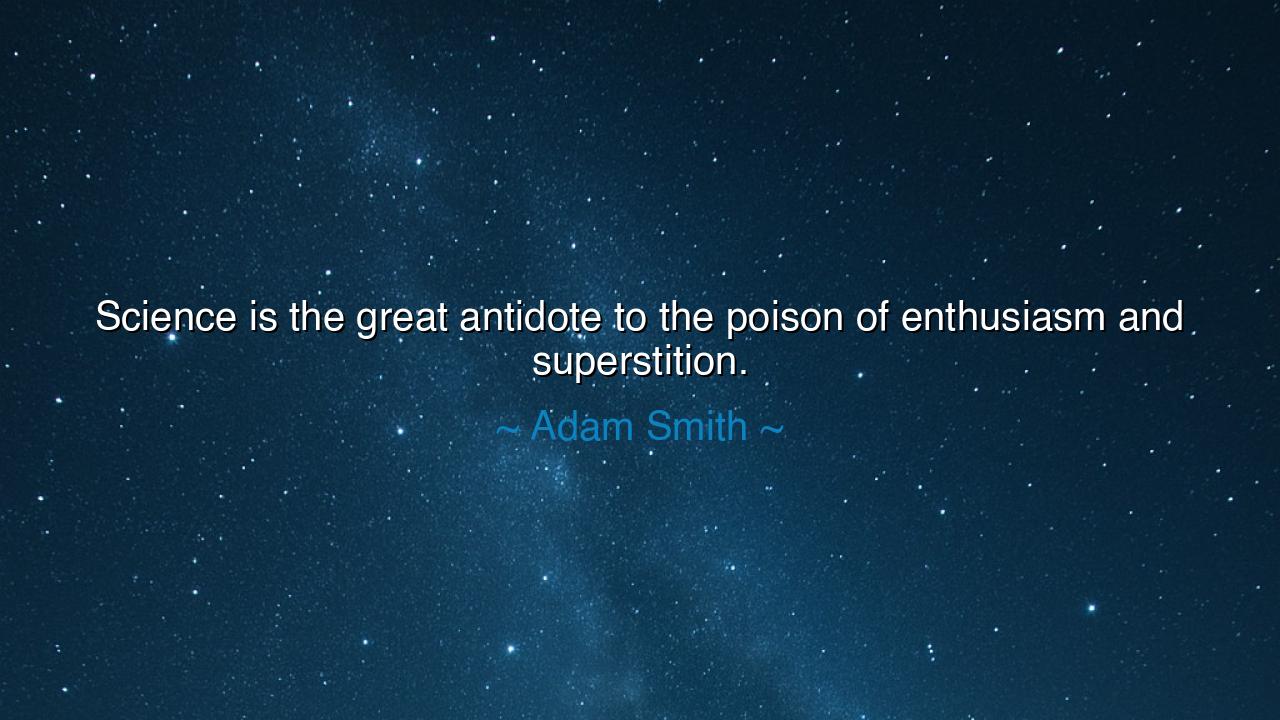
Science is the great antidote to the poison of enthusiasm and






“Science is the great antidote to the poison of enthusiasm and superstition.” Thus spoke Adam Smith, the great philosopher of reason and moral understanding, whose mind illuminated the age of Enlightenment. In this single sentence, he poured the wisdom of centuries — the struggle between truth and illusion, between the steady flame of knowledge and the wild fire of blind belief. His words are not an attack upon passion, but a call to balance: to remember that reason is the compass that must guide the heart, lest the spirit lose itself in delusion.
To understand his meaning, one must remember the world in which Smith lived. It was a time when superstition still held sway over many minds, when ignorance dressed itself in the robes of faith, and “enthusiasm” — that fever of uncontrolled emotion — led men to mistake zeal for truth. Smith saw how societies could be consumed by untested beliefs, how mobs could be stirred by fervor, and how even good men could err when they placed feeling above understanding. To him, science — not as cold calculation, but as the discipline of observation and thought — was the antidote, the medicine that restored clarity to the fevered soul.
For superstition, in Smith’s view, is the enemy of progress. It is born of fear — the fear of the unknown, the unseen, the inexplicable. It binds the mind in chains of darkness, making people slaves to rumor and imagination. Yet science, like a dawn breaking through mist, teaches the heart not to fear the unknown, but to seek it and understand it. It transforms the terror of mystery into the joy of discovery. The ancients, too, saw this truth: when Socrates urged the Athenians to question all things, he was practicing the same antidote that Smith later praised. For the philosopher, like the scientist, is a healer of the mind, driving out ignorance not with anger, but with inquiry.
And what of enthusiasm — that “poison” Smith names alongside superstition? He did not mean the enthusiasm of joy or creativity, but that unbridled zeal which blinds judgment. History offers countless examples of this peril. Think of the Crusades, when nations marched to war convinced that bloodshed could purify the soul. Think of the Salem witch trials, when fear disguised as righteousness destroyed the innocent. In each case, the flame of belief, untempered by reason, consumed the very people it was meant to enlighten. Smith’s warning was clear: when emotion rules without the guidance of understanding, humanity poisons itself.
Yet Smith’s faith in science was not the faith of arrogance. He saw science as a discipline of humility, not domination. To study the world through reason is to admit that one does not know — to question, to test, to learn anew. The scientist does not shout that he has all answers; he whispers that there is still more to discover. In this humility lies the true cure to the poisons of pride and fanaticism. For when a man begins to understand the laws of nature, he ceases to invent false gods of fear and prejudice. He learns reverence not for myths, but for truth itself — that sacred, infinite order written into the fabric of the universe.
Consider the story of Galileo Galilei, who dared to look through his telescope and saw that the Earth was not the center of the cosmos. His discovery was not merely astronomical — it was spiritual. He replaced superstition with knowledge, myth with measurement, and was condemned for it. Yet, though he stood accused, he was free within, for his mind was anchored in truth. The centuries that followed vindicated him, proving that science does not destroy faith, but purifies it, turning blind belief into enlightened wonder. This is the antidote Smith spoke of: a mind cured of fear and fever, seeing clearly at last.
So, my child, heed these words as a torch in the age of confusion. Do not surrender your reason to passion, nor your curiosity to fear. Question bravely; doubt honorably; and when you encounter mystery, seek not comfort in superstition, but courage in knowledge. Let your enthusiasm burn, but let reason hold the reins. For science, as Adam Smith taught, is not merely a pursuit of facts — it is the discipline of wisdom, the steady hand that keeps the soul from falling into madness. And remember this above all: truth needs no miracles, only minds willing to see. When you live by reason, you walk in light; when you live by fear, you wander in shadow. Choose the light — and the world will forever open before you.






AAdministratorAdministrator
Welcome, honored guests. Please leave a comment, we will respond soon